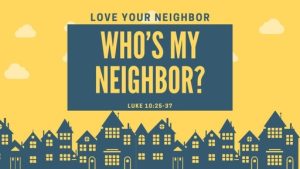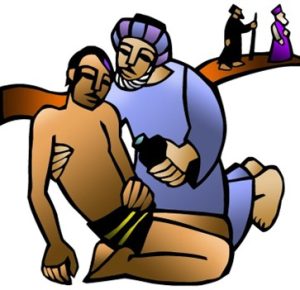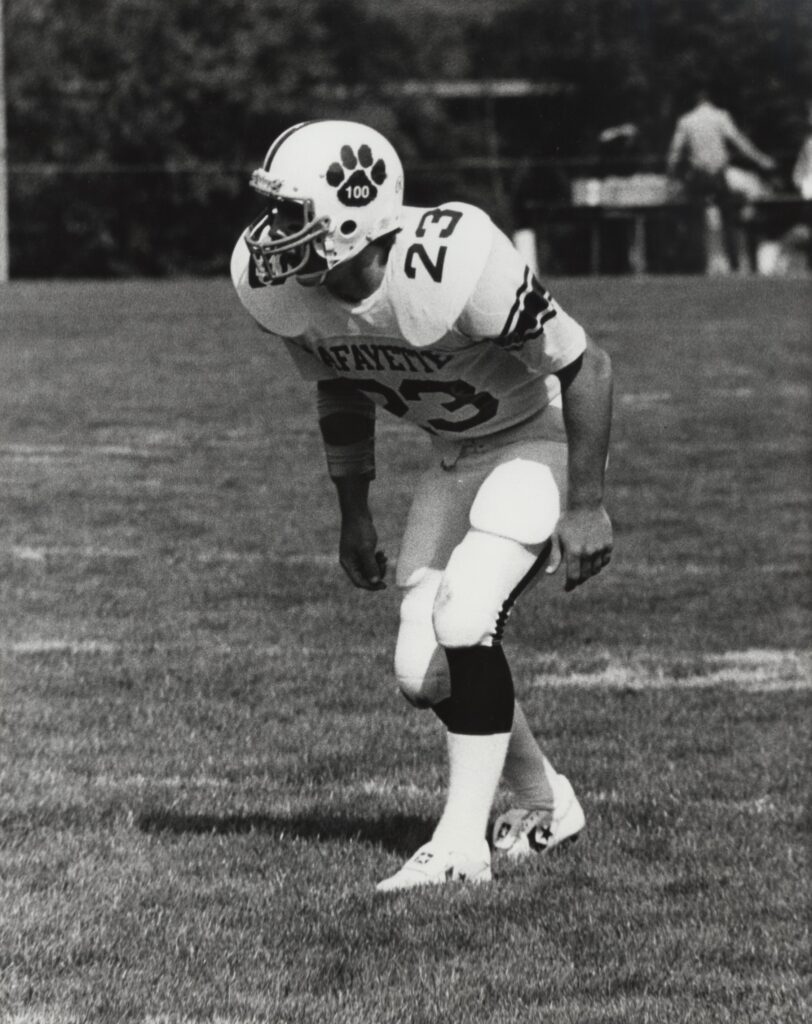 The Sunday Gospel reading at Mass was the Parable of the Good Samaritan, found in Luke 10:25-37. The parable is told by Jesus about a Jewish traveler who is stripped of clothing, beaten, and left half dead alongside the road. A Priest and then a Levite come by both avoiding the man. A Samaritan happens upon him—though Samaritans and Jews were enemies—he helps him. Jesus tells the parable in response to a provocative question from a lawyer in the context of the Great Commandment: “And who is my neighbor?”
The Sunday Gospel reading at Mass was the Parable of the Good Samaritan, found in Luke 10:25-37. The parable is told by Jesus about a Jewish traveler who is stripped of clothing, beaten, and left half dead alongside the road. A Priest and then a Levite come by both avoiding the man. A Samaritan happens upon him—though Samaritans and Jews were enemies—he helps him. Jesus tells the parable in response to a provocative question from a lawyer in the context of the Great Commandment: “And who is my neighbor?”
I am also reading the book, “Killing England”. Thomas Jefferson, who wrote the words “all men are created equal” and believed that slavery was contrary to the laws of nature where everyone had a right to personal liberty, was also a lifelong enslaver of over 600 people throughout his lifetime and profited directly from the institution of slavery.
A friend of mine has been exhaustedly working with a local Ukrainian family for years and is currently waist-deep in immigration paperwork logjams. He is currently working to solve a driver’s license renewal for a legal immigrant that is impacting his ability to work and feed his family. The total lack of empathy at the MVA is making the process more painful and longer than it truly needs to be.
The Priest and Levite were following the law as written in Deuteronomy such that they would not become unclean and fall into a state of ritual impurity. Jefferson was doing nothing against the existing law and was making a sound business judgement. The MVA agent was doing her job and following the listed procedures and policies. All were adhering to the letter of the law versus the moral requirement of the situation, as well as the commandment to “love thy neighbor” which is to will the good of our neighbor.
“Who is my neighbor?” becomes a natural question to ask. The Jews of Jesus’ day would largely have understood their “neighbor” to be their fellow Israelites. That is the most common understanding; our neighbors are the people who live in houses or apartments next to ours, across the street, or our community.
However, the true concept of “neighbor” extends beyond just physical proximity. It includes anyone we interact with or whose path we cross. In a religious context, especially with reference to the Parable of the Good Samaritan, a neighbor is anyone who has a need that we can help meet.
Our neighbors aren’t just our friends and family members. They’re not just the people we think should be our neighbors or the people we think deserve our mercy and kindness. Our neighbor is anyone in our vicinity with whom we can share God’s love. Not only those who are similar to us or with whom we are comfortable, but all whom God places in our journey.
When the lawyer asked Jesus, “And who is my neighbor?” He was asking, in effect, “Whom do I have to love?” The emphasis that Jesus places in his parable is not about knowing one’s neighbor, but about being a neighbor and providing as a neighbor. The question isn’t “Who are they?” but “Who are we?” We are called to be neighbors to those in need with whom we cross paths when it’s within our means. It’s what they’re due from us; we’re obligated to them. Respect is man given, but God demanded.
I recently failed this test while working at a trade show in Chicago this past May. It was an unseasonably cold evening and at this time of year the homeless shelters were all closed. While walking back to the hotel from dinner, I was approached by a homeless woman who asked me if I had a blanket to spare. My response was, “sorry, I’m from out of town” – as if that mattered. I had the time and ability to ‘will the good of my neighbor’ and didn’t.
In reality, who isn’t our neighbor? There’s no one in this world who doesn’t need our mercy and kindness. Everyone is our neighbor. In 1996, at a Ku Klux Klan rally in Ann Arbor, MI, 18-year-old Keshia Thomas shielded a white supremist from a crowd of attackers. She courageously threw herself between the attackers and the man, protecting him. She understood, from her own religious convictions, he was her neighbor. She didn’t have to like him or agree with him. She knew that when she served the least of her brothers, she served Jesus.
The catchphrase associated with the show “Mister Rogers’ Neighborhood” is “Won’t you be my neighbor?” This phrase is sung at the beginning of each episode and serves as an invitation to all viewers to feel connected and included in the neighborhood community. Do we allow ourselves the opportunity to be with all our neighbors and to be a neighbor to all. Or do we live lives where our only neighbors are just like our ourselves?
The concept that we love our family and then we love our neighbor, and then we love our community, and then we love our fellow citizens, and then after that, prioritize the rest of the world is not the Christian way. Jesus invited us into a different world altogether. A world where love moves freely, without hierarchy or a series of concentric circles. Where borders have been removed.
If we find ourselves asking, “Who is my neighbor?”, we already missed the point.
We should be inspired to cross the road towards our neighbor. We were created by divine compassion and also for divine compassion.




